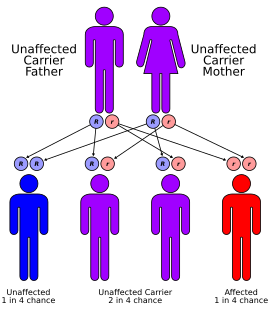Lubani Al Saleh Teebi syndrome
Appearance
| Lubani Al Saleh Teebi syndrome | |
|---|---|
| Other names | Cystic fibrosis, Helicobacter pylori gastritis, megaloblastic anemia, subnormal mentality and minor anomalies, Cystic fibrosis gastritis megaloblastic anemia[1] |
 | |
| Specialty | Medical genetics |
| Causes | Genetic mutation |
| Prevention | none |
| Frequency | very rare |
Lubani Al Saleh Teebi syndrome also known as cystic fibrosis-gastritis-megaloblastic anemia syndrome is a very rare autosomal recessive genetic disorder which consists of cystic fibrosis, helicobacter pylori-associated gastritis, folate-deficiency megaloblastic anemia and intellectual disabilities. This disorder was discovered when Lubani et al reported two siblings from consanguineous parents with the symptoms mentioned above in 1991. Since then, there have been no further reports of this syndrome in medical literature.[2][3][4][5]
References
[edit]- ^ "Lubani al Saleh Teebi syndrome". 16 June 2022.
- ^ "Orphanet: Lubani al Saleh Teebi syndrome".
- ^ Lubani, M. M.; Al-Saleh, Q. A.; Teebi, A. S.; Moosa, A.; Kalaoui, M. H. (1991). "Cystic fibrosis and Helicobacter pylori gastritis, megaloblastic anaemia, subnormal mentality and minor anomalies in two siblings: A new syndrome?". European Journal of Pediatrics. 150 (4): 253–255. doi:10.1007/BF01955524. PMID 2029916. S2CID 6022394.
- ^ "OMIM Entry - 219721 - CYSTIC FIBROSIS WITH HELICOBACTER PYLORI GASTRITIS, MEGALOBLASTIC ANEMIA, AND MENTAL RETARDATION".
- ^ "Lubani al Saleh Teebi syndrome - About the Disease - Genetic and Rare Diseases Information Center". Archived from the original on 2017-02-08. Retrieved 2022-05-10.
